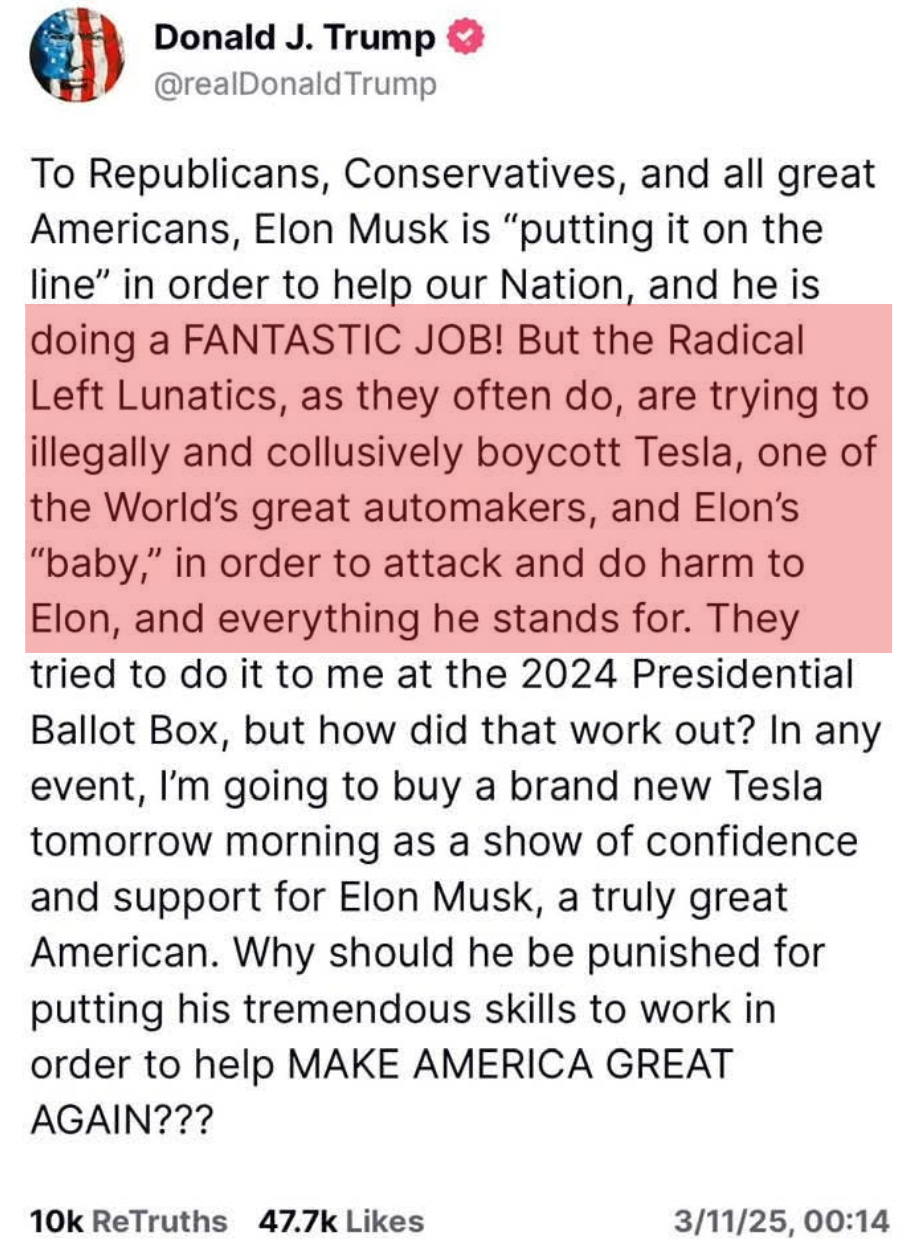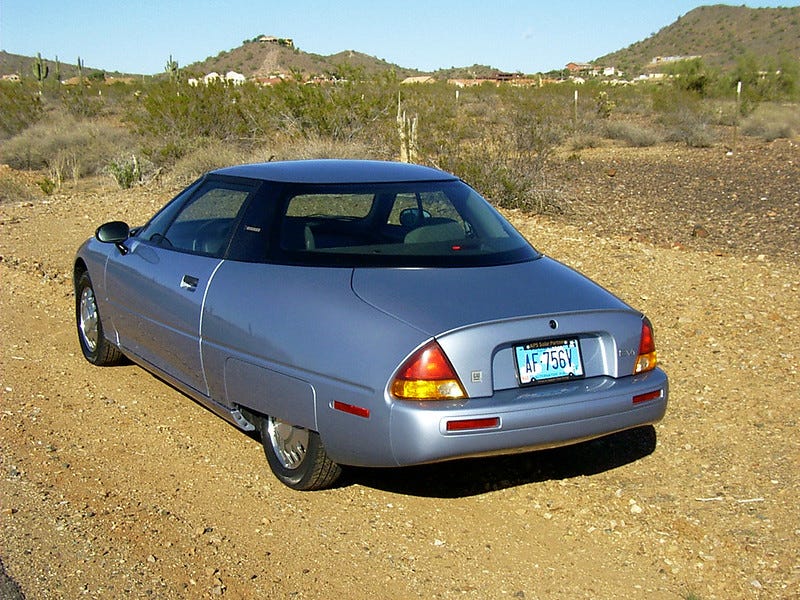Thank you for reading The Cross Section, and if you find my work valuable and would like it to continue, consider becoming a paid subscriber. This site has no paywall, so I depend on the generosity of readers to sustain the work I present here. Thanks.
On the Monday edition of his program, Fox News host Sean Hannity announced that as a gesture of devotion to Elon Musk, he is buying a Tesla. As video of anti-Tesla protests played on the side of the screen, Hannity extolled the power, acceleration, and range of the model he is purchasing, perhaps not realizing that he was making an argument for why electric cars in general are awesome. Then Tuesday morning, Donald Trump announced that he too will buy a Tesla, and expressed his belief that it should be illegal for anyone not to buy one:
This may or may not cause a legion of red-hatted MAGA bros to go out and buy their first eclectic cars, but we should all celebrate. Because while it isn’t without risk, the culture war over Tesla could turn out well for America, for democracy, and even for the climate — and quite badly for Elon Musk.
Autos and identity
As long as there have been cars, they have been invested with powerful notions of identity. Virtually all auto marketing is as much or more about what this vehicle says to the world about who you are as it is about what the car can do. Are you rugged and manly? You will be if you buy this F-150. Are you suave, sophisticated, and successful? You will be if you get this Lexus. Are you youthful and outdoorsy? This Subaru is for you. And so on.
Musk didn’t found the Tesla corporation, but when he took it over it was because he realized that if you could make electric cars cool, then not only could you sell a lot of them, you might speed the transition away from the internal combustion engine. Before then, this is what people thought of when they heard the term “electric car”:
But if electric cars were cool, anyone might buy them, not just California hippies. And as someone who was developing what would eventually become an epic addiction to attention, Musk saw selling his own image as a way to sell Teslas. For a while, that worked quite well; people viewed him as brilliant, creative, futuristic, and yes, cool, and that’s what Teslas evoked. That image resonated even with liberals, who hadn’t yet been exposed to the more rancid parts of his personality that we’re all witnessing now; he just seemed like an innovator who wanted to solve climate change (a problem that today he no longer cares about).
But then Musk bought Twitter and turned it into a festering cauldron of far-right hate speech; delivered unto the world the Cybertruck, the world’s most loathsome and pathetic vehicle; and began his own personal and very public journey toward the extreme right, culminating in his effort to get Trump elected and then dismantle everything worthwhile the federal government does, while he goes around throwing up Nazi salutes. Liberals and even some centrist normies who own Teslas are feeling increasingly besieged and embarrassed; now, rather than communicating “I’m cool and forward-looking, and I care about climate change,” owning a Tesla says “I may be a right-wing asshole.”
The developing culture war features protests at Tesla dealerships; owners desperately trying to unload their Teslas; a worldwide anti-Tesla movement that is producing stunning sales drops, especially in Europe; and extreme acts of vandalism (which to be clear, I do not support; it is not necessary to light the next Cybertruck you see on fire, since before long it will probably disassemble itself on the highway or plunge into a harbor).
On the other side, leading right-wing figures including Trump and Hannity are encouraging conservatives to buy Teslas as a way of owning the libs. How many will do so is unclear, but more certain is that their promotion of Tesla will make any non-MAGA Americans even less likely to buy one. And that might increase sales of electric cars made by other manufacturers.
There’s another benefit to this Tesla spiral: The company’s absurdly overvalued stock is why Musk is the world’s richest human, and if it continues its current decline, his wealth will be significantly diminished. He’ll still have more money than anyone could use in a thousand lifetimes, but at least there will be some satisfaction to be had there.
A brief digression on the meme stock that is Tesla
Tesla stock is dropping precipitously; in December it reached a high of $488 per share, but after yesterday’s trading it stood at $225. But even with that decline, Tesla’s stock is still wildly overpriced. One (albeit imperfect) way to measure that is the price/earnings ratio, which compares the company’s stock price to its earnings per share. Here are the P/E ratios of Tesla and other auto companies based on today’s stock prices; I threw in the major tech companies as well:
A high P/E ratio can be rational if there is good reason to believe that the company’s profits might be modest right now, but will absolutely explode in the future. There are certainly companies that have followed that path. But is there really a good reason to believe that Tesla is going to start generating exponentially more profits than it does today? How will that happen? Is it going to become the world’s only car producer, and we’ll just all have to buy Teslas whether we like it or not?
Of course not. But Tesla’s stock price was always based on the cult of Musk; people and institutions bought it because they believed that other people would keep buying it and paying more and more for it, simply because of how awesome Elon Musk is. Now that he has been revealed as kind of a moron and kind of a Nazi, and most Americans don’t want to have anything to do with him, there’s a fair chance the stock will continue dropping until it reaches a level commensurate with the company’s actual value.
The result of the Tesla culture war
A great deal is as yet unknown, especially about how this will all affect the larger electric car market. One question hanging over the industry is whether congressional Republicans are going to kill the EV tax credit signed by Joe Biden as part of the Inflation Reduction Act, which is worth up to $7,500 per car. Unfortunately, American car makers have not yet managed to produce a truly affordable EV, which is why the credit is so important to continued growth in sales. A new report from Princeton projects that if the credit were taken away, sales could drop by 30% in 2027 and 40% in 2040, compared to where they would be if the credit stayed in place (EV sales will still grow, just not as fast).
And while you might think Musk would be a powerful advocate to keep those credits in place since they drive sales of Teslas, he said on an earnings call last year that removing the credit “would be devastating for our competitors, and it would hurt Tesla slightly but long term probably actually helps Tesla.” In other words, Musk, who once said “I’ve done more for the environment than any single human on Earth,” no longer wants people to buy electric cars; he just wants them to buy Teslas. Nevertheless, the fate of the EV credit is still uncertain.
That issue aside, here are some possible results of the Tesla culture war:
Sales of non-Tesla electric cars increase
Some conservatives are converted to the cause of electric cars
It becomes even more socially unacceptable to drive a Tesla, especially a Cybertruck, which is essentially Elon Musk in vehicular form
Musk’s personal wealth is cut dramatically, making him extremely unhappy
All of which sounds like a pretty good outcome.








Even for Trump, calling a commercial product boycott "illegal" is stupid.
I remember when the media made a big deal about safety issues like the Ford Pintos catching on fire or Firestone tires exploding in hot climates. Funny how this horrifying story hasn’t gotten the same kind of attention:
“People are still being burned alive in Teslas”
https://philkoopman.substack.com/p/people-are-still-being-burned-alive
The media is far to entralled by tech bros to report objectively about their products.